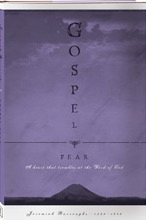
What is the Gospel? It literally means "good news." What is the good news brought to us by Jesus. Jeremiah Burroughs summarizes it here:
"The gospel of Christ in general is this: It is the good tidings that God has revealed concerning Christ. More largely it is this: As all mankind was lost in Adam and became the children of wrath, put under the sentence of death, God, though He left His fallen angels and has reserved them in the chains of eternal darkness, yet He has thought upon the children of men and has provided a way of atonement to reconcile them to Himself again... Namely, the second person of the Trinity takes man's nature upon Himself, and becomes the Head of a second covenant, standing charged with sin. He answers for it by suffering what the law and divine justice required, and by making satisfaction by keeping the law perfectly, which satisfaction and righteousness He tenders up to the Father as a sweet savor of rest for the souls that are given to Him...And now this mediation of Christ is, by the appointment of the Father, preached to the children of men, of whatever nation or rank, freely offering this atonement unto sinners for atonement, requiring them to believe in Him and, upon believing, promising not only a discharge of all their former sins, but that they shall not enter into condemnation, that none of their sins or unworthiness shall ever hinder the peace of God with them, but that they shall through Him be received into the number of those who shall have the image of God again to be renewed unto them, and they they shall be kept by the power of God through faith unto salvation." - Jeremiah Burroughs
Now that is good news! None of our past sins will condemn us in God's sight. The fact that none of our present sins or future unworthiness will ever prevent our peace with God. All God requires is that we feel our need of Him - knowing who Jesus is, believing that he is the person described in the Bible and trusting his perfect life, sacrificial death and glorious resurrection to make us OK with God. That is good news. Praise God!
John















